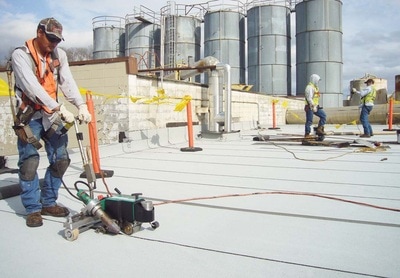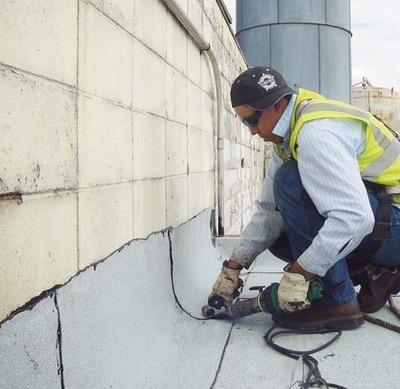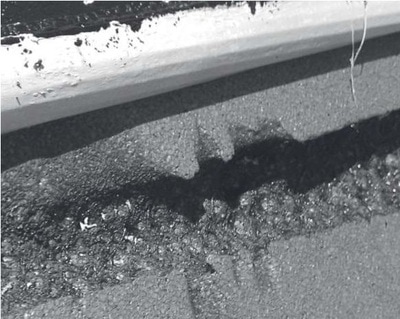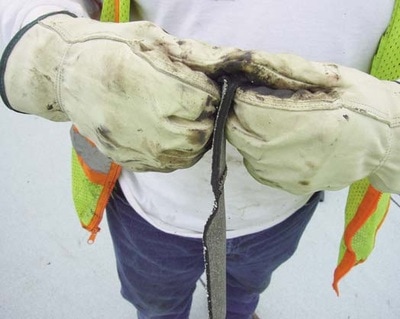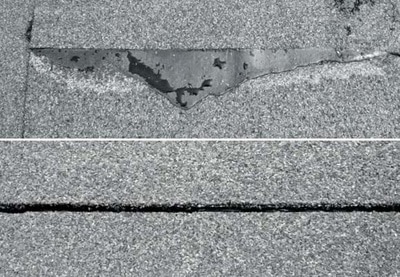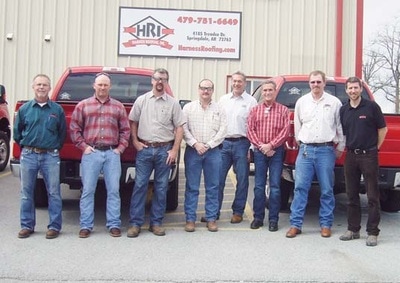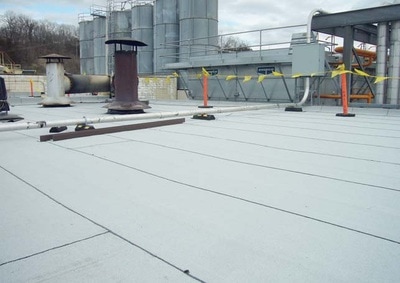|
Tyson Foods Inc. (TSN) recently required conversion work on their production facility in Noel, Mo. Although the roof was to be sealed with bitumen sheeting, the building owner specified that no welding was to be performed with an open flame on the roof. A specification the roofing company, Harness Roofing, could easily abide by using the BITUMAT B2 from Leister. Open flame entails risks Globally, flat roofs have a diverse set of roof sealing systems. Thermoset and thermoplastic single-ply membranes, and modified bitumen (APP, SPS) are the most widespread. With the application of the latter, a bitumen seal is associated with certain dangers or hazards when torch welding is used during the application. Each sheet undergoes a largescale flame treatment with a Bunsen burner. The overlapping sheet is then pressed onto the fused lower sheet. This is a method fraught with risk as the thermal insulation located below the seal or the flammable roof substructure can catch fire. As a result, more and more building owners are prohibiting the use of an open flame for safety reasons. Flame-free welding required Tyson Foods, with headquarters in Springdale, Ark., is one of the world's largest processors and marketers of chicken, beef and pork, as well as prepared foods. The roof of Tyson Foods’ Noel, Mo., production facility, had become quite old and was replaced. Approximately 1,968 square feet (600 meters) had to be newly sealed as quickly and neatly as possible. When it came to the sealing material for the massive roof area the decision makers opted to use bitumen, but only under the condition that open flame would NOT be utilized during the roofing work. This specification did not pose a problem for Harness Roofing. They knew Leister had a welding tool in its range that welds bitumen sheeting with hot air instead of an open flame, the BITUMAT B2. Proven solution found Harness Roofing, Harrison, Ark., is a renowned layer of roof seals in the state of Arkansas and enjoys an excellent reputation when it comes to quality. Harness Roofing had already been working with Leister's range of handheld tools for many years and is a firm advocate of the quality provided by these tools. Leister’s top selling hand tool, the TRIAC S, and the more powerful ELECTRON have been used for detailed welding at Harness Roofing for decades. However, open flame was still used for large area welding. Tyson Foods' specifications required that Harness Roofing abandon this method for this project. It was clear that a proven, flameless solution would have to be implemented for welding the base seams. Harness Roofing placed their trust in a tool provider who they knew well. With the BITUMAT B2, Leister was able to offer a hot air welding machine that met all of Tyson Foods’ requirements. Tremendous productivity and efficiency Harness Roofing accepts nothing short of optimum quality standards. To satisfy this requirement, the selection of the right tool and a well-trained workforce were top priorities to the roofing contractor. Leister offered both. The long established Swiss company not only offered suitable tools, but with its international network of over 120 certified sales and service centers, Leister also trained the Harness Roofing team to ensure they were able to utilize their new contrivances expertly. The Leister sales and service partner, Heely Brown Company, and a Leister employee organized an intensive training session with Harness Roofing employees on the BITUMAT B2. After the inaugural attempts on the roof, it was clear to the roofing contractor that the work with the new hot air machine not only offered an alternative to an open flame but actually represented the ideal solution in every respect. The highperformance nozzle, specially developed for working with bitumen, enabled a working speed of nearly 7 meters (23 feet) per minute. Requiring only one person to operate the BITUMAT B2 combined with the high working speed translated to higher productivity. Neat weld seams and convenient handling The BITUMAT B2 is designed with an integrated air dam — rotating rubber belt located between the drive and pressure roller — ensuring that the bitumen sheet is pressed downward during the welding process, while the controlled hot air volume is routed between the bitumen sheets. The use of this feature results in consistent, uniform weld seams. Furthermore, the air dam better focuses and traps the air precisely where it is needed, preventing the burning of the underlying thermal insulation. In controlled peel tests, the BITUMAT B2 achieved more consistent results when compared with welds achieved with a torch. The heightadjustable handle of the BITUMAT B2 makes maneuvering the machine during the welding process simple. Besides the adjustable parameters for speed, temperature and air volume, weight can also be adapted to the conditions of the material by attaching additional weight. Equipped for the future Although bitumen remains attractive to some building owners, specifications and regulations for applying bitumen are beginning to become more stringent. For example, the City of New York has a statute that prohibits "torched down" roofs on combustible buildings and requires additional certifications for operators of torches. Due to such laws and emerging insurance regulations, many companies are being forced to adapt and seek out alternatives to welding with an open flame. Harness Roofing has found one such solution with the BITUMAT B2 ensuring they are adapting for the future. After the successful use of the BITUMAT B2 on the roof of Tyson Foods, it is clear to Harness Roofing that welding flameless bitumen is a welcomed addition to their repertoire. Apart from the safety aspect, the improved processing quality, ergonomic way of working and increased productivity are convincing arguments in favour of welding with hot air and hence the BITUMAT B2 for the roofing professionals from Arkansas. Building owner: Tyson Food, Inc., Noel, Missouri, www.tyson.com
Laying company: Harness Roofing, Harrison, Arkansas, www.harnessroofing.com Material: Modified bitumen, Soprema 180FR GR Device supplier: Leister Technologies AG, Switzerland, www.leister.com Leister Sales and Service partners: Heely-Brown Company, Atlanta, Georgia, USA, www.heely-brown.com Subdistributor: SPEC Building Material Corporation www.specbmc.com Text: Christophe von Arx, Leister AG Photos: Roland Beeler, Leister Technologies AG Comments are closed.
|
|
STANMECH Technologies Inc.
944 Zelco Drive Burlington ON L7L 4Y3 | 1-888-438-6324 | [email protected] Terms of Use Privacy Terms and Conditions of Sale Warranty Policies |
|
Proud Member of:

